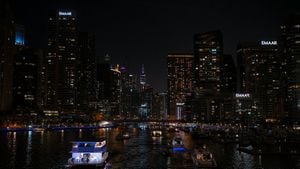On November 4, 2024, the Port of Hamburg witnessed the grand christening of Hapag-Lloyd's flagship vessel, the "Hamburg Express." This impressive container ship, part of the innovative "Hamburg Express" class, was ceremoniously named by Eva Maria Tschentscher, the First Lady of Hamburg and spouse to the city’s First Mayor, Dr. Peter Tschentscher.
At the event held at the Container Terminal Burchardkai, CEO of Hapag-Lloyd, Rolf Habben Jansen, highlighted the technological advancements and environmental sustainability embodied by the Hamburg Express. "With the ‘Hamburg Express,’ we are setting new standards in technology and sustainability. She will reinforce our status as the number one in quality and efficiency for our customers, especially on the strategically important Far East-Europe routes,” he stated.
Dr. Tschentscher echoed this sentiment, expressing pride not only for the vessel but also for Hapag-Lloyd's long-standing connection with Hamburg, which spans over 175 years. "The Hamburg Express is a flagship for the world-class shipping company Hapag-Lloyd and for Hamburg as a strong and cosmopolitan port city. The ship class sets new standards in sustainability and economic efficiency, making shipping ever more climate-friendly," he noted. The connection is not just about nostalgia; it's about the future of shipping and environmental responsibility.
The Hamburg Express is one of twelve new large container ships being constructed at the Hanwha Ocean shipyard located in South Korea. Measuring at 399 meters long with the capacity to transport 23,660 TEU (twenty-foot equivalent units), this vessel holds the title as the largest container ship to sail under the German flag.
What's remarkable about these ships is not just their size but also their commitment to sustainability. They are equipped with LNG (liquefied natural gas) dual-fuel engines, which allow for significant reductions in emissions—by approximately 20 to 25 percent. This efficiency is critically important as shipping is under scrutiny for its environmental impact. The Hamburg Express can run on biomethane and e-methane, positioning itself for future operations relying on non-fossil fuels as they become available.
The christening happened shortly after Hapag-Lloyd launched the Gdansk Express, another vessel within this same class, at the Hanwha Ocean yard. With these new introductions to their fleet, Hapag-Lloyd is clearly investing heavily in eco-friendly shipping solutions.
This effort aligns with Hapag-Lloyd's overarching goal to transition to a completely climate-neutral operation by the year 2045. Recently, the company also placed orders for up to thirty more LNG dual-fuel container vessels, indicating their commitment to sustainability and efficiency. This is all part of their strategic vision to maintain leadership not only as a major shipping company but also as a responsible environmental steward.
Overall, the christening of the Hamburg Express is more than just the naming of a ship; it's the beginning of a new chapter for Hapag-Lloyd, setting standards for sustainability and efficiency, reflecting the synergy between Hamburg's maritime heritage and its future forward-thinking initiatives.



